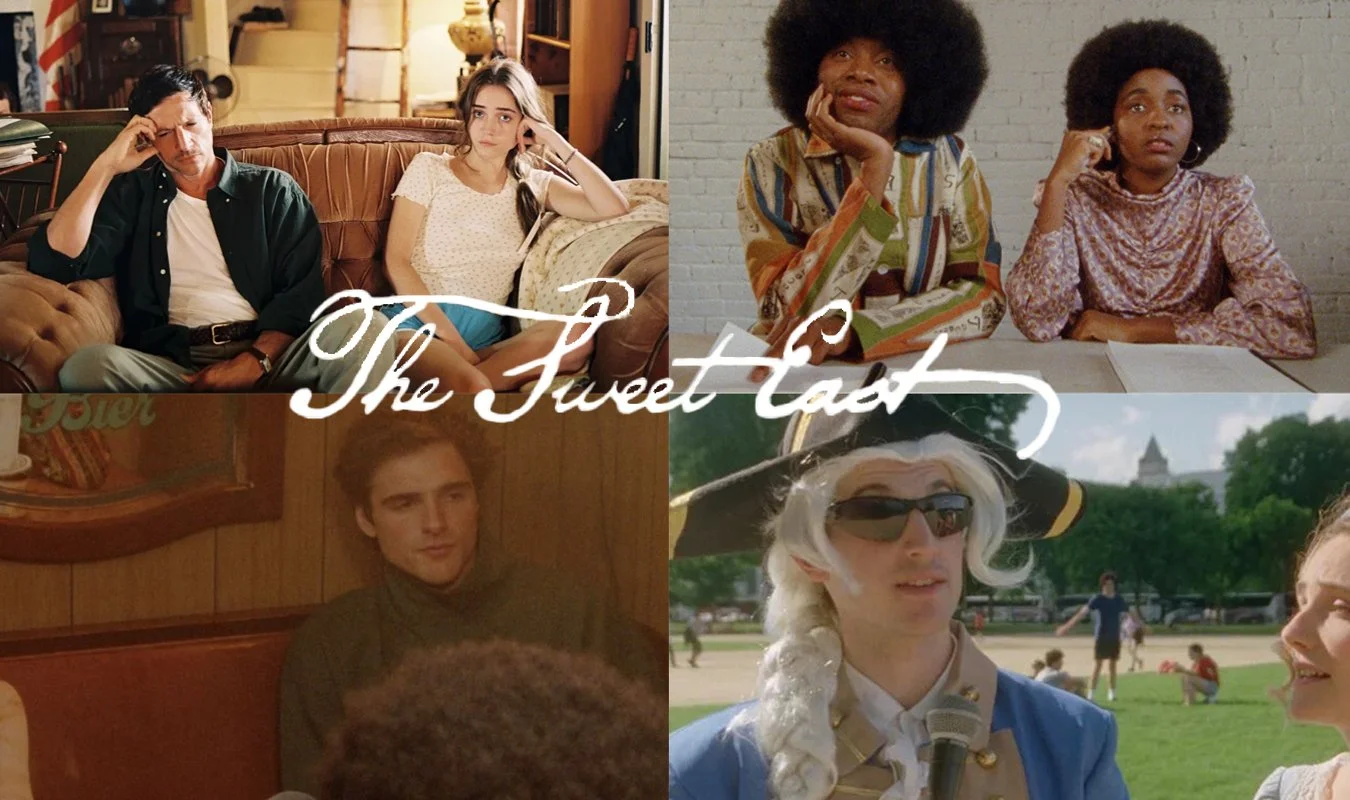Review | ‘The Sweet East’ is an intimate epoch of oddities and Americana
Cinematographer Sean Price Williams’ directorial debut takes a bleak look into the more unique pockets of American culture through a grubby aesthetic and an elusive protagonist. Photo collage by JACK SUNDBLAD, Staff Photographer
Ironically titled “The Sweet East,” the minds behind this 104-minute, spellbinding romp seem to reflect upon their grand ole country — and all the little freaks that reside within its Northeastern parts — with a sour taste in their mouths. There is little that is fond or sentimental or sugary-sweet about their vision of America. It’s a grimy, disorienting blender of genre and medium that pulls no punches as it carousels through zeitgeists and ideologies.
Guided by the blasé Lillian (Talia Ryder), our journey begins on a high school trip to Washington, D.C., where a gaggle of sexually liberated seniors seem far more concerned with exploring each other's bodies than their nation’s history. After stumbling into a mass shooting at a bar/pizza joint — brought to life by MTV’s Andy Milonakis reenacting Pizzagate — Lillian loses her phone and reaches safety with the help of punk anarchist group leader Caleb (Earl Cave).
And that’s just the catalyst into an intimate epoch traversing the more extreme pockets of Americana. Come for the supporting cast of rising stars (Ryder, Cave, Jacob Elordi, Ayo Edebiri, Simon Rex, Jeremy O. Harris, Rish Shah), stay for a scholarly neo-nazi, loquacious movie directors, an EDM-loving cult and a penis overrun with dozens of piercings. I’ll let you mix and match who belongs to what.
Leading the charge is acclaimed cinematographer Sean Price Williams, who juggles camera duties with the role of debut director. His handheld, out-of-focus and grainy imagery, accompanied by a claustrophobic production design and wacky score, makes for a truly unique aesthetic that isn’t always the easiest to sit back, relax and enjoy. The lack of conventions keeps you on your toes and forces you to expect the unexpected. Williams isn’t afraid to throw curveballs that take shape in the form of musical numbers, bursts of animation and puppets.
Williams’ direction works hand-in-hand with film critic Nick Pinkerton’s script, where words are bountiful and everybody has an observation to make about America. They love it. They hate it. Everything in between.
A knock on the film has been the lack of stance taken by Pinkerton. With so many observations on display, there are no claims made, profundities expelled or sympathies given by the end of the film except the words “Everything will happen.” But I found the down-the-middle, nihilistic approach refreshing. I felt a stance taken would have altered the tones of each chapter and disrupted the immersive chaos.
The protagonist, Lillian, is an unusual one. She’s nonchalant. She’s lackadaisical. She’s an enigma. She shrugs her shoulders and delves into the next adventure with such fluidity and carelessness. She listens to the eccentric characters around her spew fun facts, and like a sponge, she absorbs them. She’ll listen to someone spill their love for the works of Edgar Allen Poe, and in the following step of her journey, will tell the next kook that she studied Victorian-era poetry in college. There’s little truth to her as she continuously puts on different personas.
Lillian feels like a Gen-Z stand-in — a part of a frustrated generation who inherited a decaying world with shootings, global warming, impossible debt and mass hysteria, and in response, simply doesn’t care anymore. What’s left to do, except follow the yellow brick road and see where it takes her? Ryder plays Lillian with perfection, although, I did wish for an iota more intention and motivation behind her character.
Each member of the supporting cast delivers and shines in their segments. In a contemporary world characterized only by vapes and an occasional cell phone, they embody different times, ideas and movements that help the story feel timeless. As many of them rise the ranks in popular culture, I admire that figures such as Elordi and Edebiri are still willing to commit to low-budget independent films where they can tackle more peculiar roles that flex their range.
While a majority of the film manages to keep up its vigorous pace, the third act loses a bit of steam. After what could have been the climax, the film meanders and dips a little too deep into surrealism. The could-have-been climax relinquishes any narrative throughlines, making the final act feel like a long walk in the woods with no end in sight. And suddenly, it ends.
On top of the structural choices, some of the more unorthodox creative choices took me out of the film instead of further immersing me. Specifically, the score, which utilizes an abundance of strange noises like a cuckoo clock, drew me out of the verisimilitude. Regardless, I can’t help but admire that a film utilized cuckoo clocks in its score.
“The Sweet East” feels like a movie that will be appreciated in years to come. Loaded with humor, wit and oddity, there’s much to enjoy in this promising debut from both Williams and Pinkerton, but also plenty to be weirded out by. This film causes as much anxiety as I’m sure the high school field trip chaperones felt when they lost Lillian. Maybe do a better head count next time?


